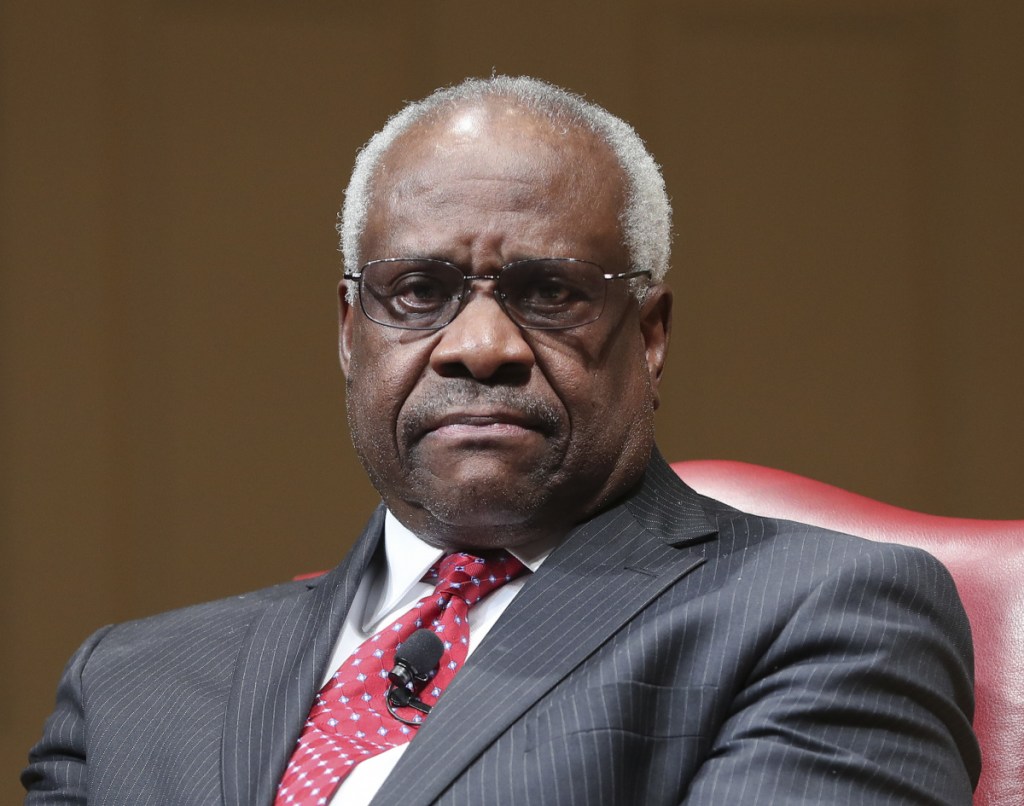WASHINGTON —The Supreme Court seemed likely Wednesday to rule for a black Mississippi death row inmate whose prosecutor has a history of improperly excluding African-American jurors.
The arguments were enlivened at the end by questions from Justice Clarence Thomas, who almost never speaks in court.
A clear majority of the court was troubled by the actions of District Attorney Doug Evans in the prosecution of inmate Curtis Flowers, who has been tried six times for murder.
“The history of this case, prior to this trial, is very troubling,” said Justice Samuel Alito, who often sides with prosecutors in criminal cases.
Three convictions were tossed out, including one when the prosecutor improperly excluded African-Americans from the jury. In the second trial, the judge chided Evans for striking a juror based on race. Two other trials ended when jurors couldn’t reach unanimous verdicts.
In the sixth trial, the jury was made up of 11 whites and one African-American, and Evans struck five black prospective jurors.
“Can you say that you have confidence in how this all transpired in this case?” Justice Brett Kavanaugh asked Mississippi lawyer Jason Davis. The state’s lawyer said he could.
Thomas is the only African-American on the court and last asked a question at arguments in 2016. But after his colleagues peppered lawyers with questions about striking African-Americans from the jury, Thomas asked if Flowers’ lawyer had similarly excused jurors and of what race.
Sheri Lynn Johnson, representing Flowers, replied that the trial attorney excused three white jurors.
Thomas was the lone dissenter in 2016 when the Supreme Court ruled for a black inmate from Georgia in a similar case.
In the course of selecting a jury, lawyers can excuse a juror merely because of a suspicion that a particular person would vote against their client. Those are called peremptory strikes, and they have been the focus of the complaints about discrimination.
The Supreme Court’s decision in Batson v. Kentucky in 1986 set up a system by which trial judges could evaluate claims of discrimination and the race-neutral explanations by prosecutors.
Flowers, now 48, has been in jail for 22 years, since his arrest after four people were found shot to death in a furniture store in Winona, Mississippi, in July 1996.
Prosecutors say Flowers was a disgruntled former employee who sought revenge against the store’s owner because she fired him and withheld most of his pay to cover the cost of merchandise he damaged. Nearly $300 was found missing after the killings.
Defense lawyers, though, say witness statements and physical evidence against Flowers are too weak to convict him. A jailhouse informant who claimed Flowers had confessed to him recanted in recorded telephone conversations with American Public Media’s “In the Dark” podcast. A separate appeal is pending in state court questioning Flowers’ actual guilt, citing in part evidence that reporters for “In the Dark” detailed.
Send questions/comments to the editors.



Success. Please wait for the page to reload. If the page does not reload within 5 seconds, please refresh the page.
Enter your email and password to access comments.
Hi, to comment on stories you must . This profile is in addition to your subscription and website login.
Already have a commenting profile? .
Invalid username/password.
Please check your email to confirm and complete your registration.
Only subscribers are eligible to post comments. Please subscribe or login first for digital access. Here’s why.
Use the form below to reset your password. When you've submitted your account email, we will send an email with a reset code.